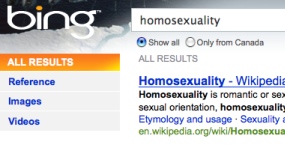Microsoft’s Bing is censoring search results that could yield sex- or gay-related content in Arab countries, reports the OpenNet Initiative (ONI).

Censored keywords include sex, porn, intercourse, breast, nude, gay, lesbian and homosexuality. See a longer list here.
ONI says attempts to use any of the filtered keywords generates a message
in Arabic or English which reads, “Your country or region requires a strict Bing SafeSearch setting,
which filters out results that might return adult content.”
The blanket censorship applies to some Arab countries that don’t even practise social content filtering (eg sex, nudity and homosexuality), such as Algeria and Lebanon, says ONI.
Arab users can work around the censorship by using a different search engine (eg Google) or changing their location settings in Bing to a country like Canada or the US, says ONI. But censorship is the default, and users may not be aware of the options.
“It is unclear still whether Microsoft is acting at the behest of local
officials, interpreting local law, seeking to pre-empt future regulation
or attempting to position the company as a good corporate citizen,” says the ONI report. “The fact that they employ a single filtering policy throughout the
region implies that they are following one or both of the latter
approaches rather than the former.”
Read the full report from the OpenNet Initiative
Read more on Xtra.ca:
- Hunk du Jour among “overtly sexual” apps banned by Apple
- Facebook censors trans man’s pic – again
- Australia charges ahead with internet censorship
- Facebook censors gay retailer
 Why you can trust Xtra
Why you can trust Xtra


